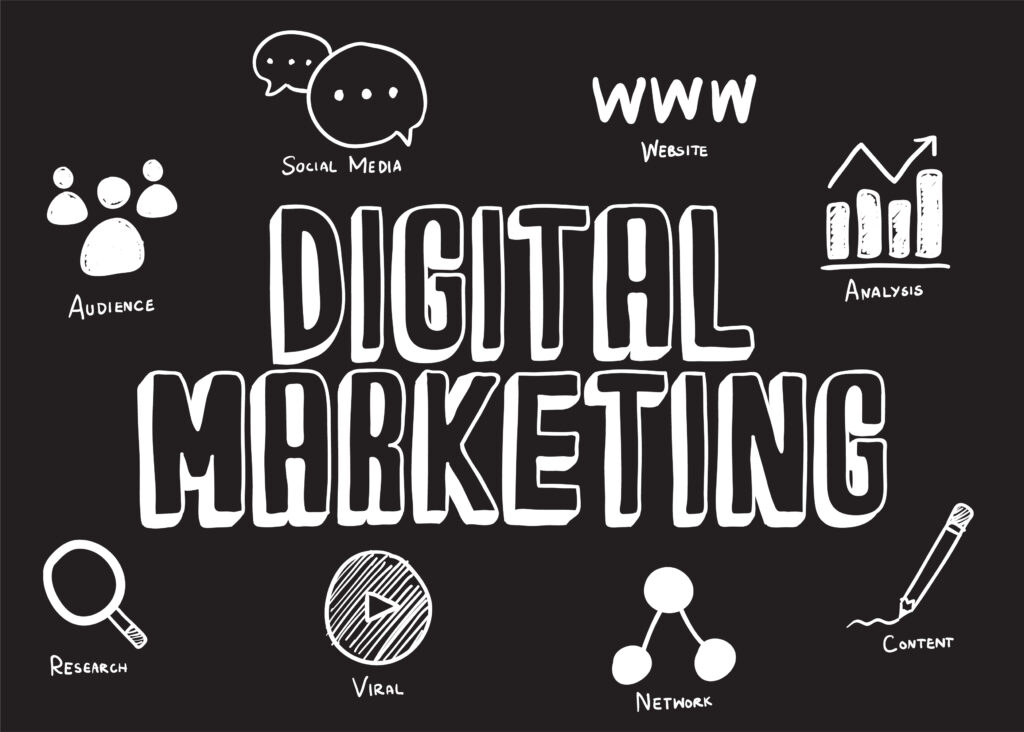Digital marketing is a broad term that includes various online strategies used by businesses and organizations to promote their products, services, or brands to a wider audience. It leverages digital channels and technologies to connect with potential customers where they spend much of their time online.

How Digital Marketing Works:
Website and Online Presence: The foundation of digital marketing is having a well-designed website that serves as a central hub for your online activities. This is where potential customers can learn more about your business.
Search Engine Optimization (SEO): SEO involves optimizing your website’s content and structure to rank higher in search engine results.
Content Marketing: Content marketing includes various forms of marketing strategies. it’s creating and sharing valuable and relevant content to engage your targeted audience.
Social Media Marketing: Businesses use social media platforms. like Facebook, Twitter, Instagram, and LinkedIn. connect with their audience, share content, and run targeted advertising campaigns.
Email Marketing: Email marketing involves sending targeted emails to a list of subscribers to promote products, share news, or build relationships with customers.
Affiliate Marketing: Businesses can partner with affiliates who promote their products or services in exchange for a commission on sales generated through their efforts.
Analytics and Data Analysis: Digital marketers use various tools to collect and analyze data about their online activities. This helps them measure the effectiveness of their campaigns and make data-driven decisions for optimization.
Marketing Automation: Automation tools are used to streamline repetitive marketing tasks like sending emails, posting on social media, and managing customer data.
Conversion Rate Optimization (CRO): CRO focuses on improving the percentage of website visitors who take a desired action like making a purchase or filling out a contact form.
Mobile Marketing: With the increasing use of mobile devices. marketers optimize their strategies for mobile platforms like mobile apps.
Remarketing: It involves targeting users who have previously interacted with your website you can again target them.
Working Mechanism of Digital Marketing:
Digital marketing works by combining these strategies and channels to create a comprehensive online presence, attract potential customers, engage with them, and convert them into loyal customers. The key to success is understanding your target audience, continuously monitoring and adapting your strategies, and staying up-to-date with the latest trends and technologies in the digital landscape. The main role of marketing tools is to help you generate new traffic, leads, and sales for your business.
By itself, it is the process of marketing your brands online to prospective leads and high-value consumers. It tool plays a vital role in driving business growth in today’s digital age. Brands collaborate with influencers to promote their products or services to a larger and more engaged audience. Pay-per-click (PPC) Advertising is often on platforms like Google Ads and Bing Ads. It allows businesses to bid on keywords and pay only when a user clicks on their ads.
Key Aspects of Digital Marketing to Business Growth:
- Increased Visibility: A digital marketing tool helps brands to increase their online visibility. like search engine optimization, businesses can rank higher. it’s making it easier for customers to find them.
- Targeted Advertising: Digital marketing allows businesses to target their advertising efforts precisely. This means you can reach the right audience based on demographics, interests, and behavior.
- Data-Driven Decision Making: this type of marketing provides access to extensive data and analytics. This data can be used to understand customer behavior, preferences, and trends. It enables businesses to make informed decisions and optimize their marketing strategies.
- Content Marketing: Creating valuable and relevant content is a core component of digital marketing. High-quality content attracts and engages customers.
- Social Media Engagement: Social media platforms are powerful tools for engaging with customers and building brand loyalty. Digital marketing leverages social media to connect with audiences, receive feedback, and foster a sense of community.
- Mobile-Friendly Marketing: More people use mobile devices that are adapted to be mobile-friendly. This ensures that businesses can reach customers on their preferred devices.
- E-commerce Integration: For businesses selling products, it is essential for driving traffic to their e-commerce platforms and increasing sales.
- Competitive Advantage: In highly competitive markets, digital marketing can provide a competitive edge. A well-executed marketing strategy can help a business stand out from its competitors.
- Measurable Results: Digital marketing campaigns can be measured with precision. The key performance indicators of click-through rates, conversion rates, and return on investment (ROI) can be tracked and analyzed.
Conclusions:
Digital marketing has become an integral part of business growth in the digital age. It helps businesses reach their target audience, build brand awareness, and drive sales through cost-effective and data-driven strategies. Embracing digital marketing is often essential for staying competitive and thriving in today’s business landscape. With the use internet and web technology, businesses can reach a global audience. Digital marketing enables companies and brands to expand beyond their local markets and tap new customers worldwide.
I hope you have liked the information given in this blog.
Please do comment and share the blog with the maximum number of people.
